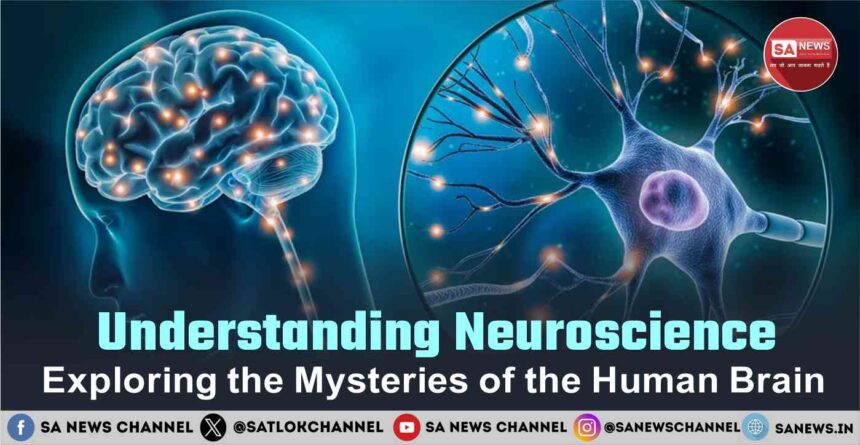Neuroscience is the scientific study of the brain and nervous system. It aims to uncover how these intricate systems control everything we do—from movement and breathing to thoughts, emotions, and decision-making. Our brain governs basic bodily functions and complex cognitive processes such as memory, learning, and emotional regulation.
- What is Neuroscience?
- The Structure of the Brain
- Neurons and Their Role in Neuroscience
- Brain Function and Cognitive Processes
- Neuroscience and Mental Health
- Neuroplasticity and Brain Development
- Neurological Diseases and Disorders
- The Role of Technology in Neuroscience
- Future of Neuroscience
- Conclusion
- The Divine Knowledge of Sant Rampal Ji Maharaj on the Brain and Soul
- Frequently Asked Questions (FAQs)
- 1. What is neuroscience in simple terms?
- 2. Why is neuroscience important?
- 3. What careers can you pursue in neuroscience?
- 4. What are neurotransmitters and why are they important?
- 5. Can the brain really change over time?
- Connect With Us on the Following Social Media Platforms
The importance of neuroscience extends beyond curiosity. It plays a vital role in improving mental health, enhancing brain function, and treating neurological diseases. By understanding the brain’s structure and operations, researchers develop better treatments for conditions like depression, anxiety, Alzheimer’s, and Parkinson’s disease, helping millions live healthier lives.
What is Neuroscience?
Neuroscience is the branch of science that focuses on studying the brain and nervous system. It connects multiple disciplines including biology, psychology, medicine, and chemistry. Neuroscientists explore everything from how individual neurons function to how networks of neurons influence behavior and cognition.
The Interdisciplinary Nature of Neuroscience
Neuroscience is inherently interdisciplinary, drawing from various scientific areas to create a holistic understanding of the brain. For example:
- Neurobiology focuses on the biology of the nervous system.
- Neurochemistry examines chemical interactions in the brain.
- Neuropsychology studies how brain function influences behavior and mental processes.
Together, these fields provide a deeper understanding of how the brain works in both healthy and diseased states.
The Structure of the Brain
The human brain is a complex organ weighing around three pounds and containing about 86 billion neurons. Each region of the brain serves a unique function, coordinating everything from basic motor control to higher-level reasoning.
Also Read: Exploring Scientific Breakthroughs: Unveiling the Future
Cerebrum
The cerebrum is the largest part of the brain and is responsible for higher-order functions such as thought, memory, and voluntary movement. It is divided into two hemispheres, with each hemisphere controlling the opposite side of the body.
Cerebellum
Located underneath the cerebrum, the cerebellum helps coordinate movement and balance. It ensures our actions are smooth and controlled, supporting activities like walking, writing, and playing sports.
Brainstem
The brainstem connects the brain to the spinal cord and manages vital functions like heart rate, breathing, and digestion. It also regulates sleep and alertness, serving as a communication bridge between the brain and the rest of the body.
Neurons and Synapses
Neurons are the basic building blocks of the nervous system. These specialized cells transmit electrical signals throughout the body. Communication between neurons occurs at synapses—tiny gaps where neurotransmitters are released to carry signals across to other neurons.
Neurotransmitters are chemicals like dopamine, serotonin, and glutamate. They are essential for mood regulation, cognition, and overall brain function.
Neurons and Their Role in Neuroscience
Neurons are designed to send electrical signals over long distances. They are the primary communication channels in the nervous system.
Types of Neurons
- Sensory Neurons – Carry information from sensory organs (like the eyes and skin) to the brain.
- Motor Neurons – Transmit signals from the brain to muscles, enabling movement.
- Interneurons – Found mainly in the brain and spinal cord, these neurons process information between sensory and motor neurons.
How Neurons Communicate
Neurons communicate through a mix of electrical and chemical signals. When activated, a neuron sends an electrical impulse down its axon to the synapse. Neurotransmitters are then released and cross the synaptic gap to bind with receptors on the next neuron, continuing the signal chain.
Brain Function and Cognitive Processes
The brain is central to nearly every aspect of human behavior and cognition. It helps us think, remember, feel emotions, and make decisions.
Memory Formation
Memory involves encoding, storing, and retrieving information. Areas such as the hippocampus and prefrontal cortex are essential for forming and recalling memories. Neuroscientists study these processes to improve learning techniques and treat memory disorders like Alzheimer’s.
Cognition and Decision-Making
Cognition includes mental processes like attention, reasoning, and problem-solving. The prefrontal cortex is especially involved in decision-making, helping weigh options and anticipate consequences before acting.
Emotional Regulation
The limbic system, which includes the amygdala and hippocampus, plays a key role in emotion. It helps us process emotional responses and influences how we react to stimuli. Understanding emotional regulation is critical for addressing mental health conditions such as anxiety and depression.
Neuroscience and Mental Health
Neuroscience is fundamental to understanding mental health disorders like depression, anxiety, schizophrenia, and bipolar disorder. These conditions often have biological roots, and neuroscience helps uncover the brain mechanisms behind them.
Advancing Treatments for Mental Health
Thanks to neuroscience research, we have better medications and therapies today. For example:
- Antidepressants target neurotransmitter imbalances.
- Cognitive Behavioral Therapy (CBT) is based on understanding how thoughts and emotions are processed in the brain.
This knowledge leads to more effective, personalized treatments for mental health challenges.
Neuroplasticity and Brain Development
Neuroplasticity refers to the brain’s ability to change and adapt over time. It involves the formation of new neural connections in response to learning, experiences, and environmental factors.
How Experiences Shape the Brain
When you learn a new skill or language, your brain forms new pathways to accommodate the knowledge. This flexibility is crucial for personal growth, learning, and adaptation throughout life.
Brain Recovery After Injury
Neuroplasticity also enables recovery from brain injuries and strokes. In some cases, the brain can reorganize itself to take over functions from damaged areas, helping individuals regain lost abilities.
Neurological Diseases and Disorders
Neurological conditions such as Parkinson’s disease, Alzheimer’s disease, multiple sclerosis, and epilepsy affect millions worldwide. These disorders often result from neuron damage or disrupted brain communication, leading to symptoms like motor issues, memory loss, and cognitive decline.
Diagnosing and Treating Neurological Diseases
Neuroscience has made great strides in identifying and treating neurological disorders. Diagnostic tools like MRI and CT scans allow doctors to visualize brain abnormalities. Treatments now include medications, physical therapy, and advanced interventions like deep brain stimulation.
The Role of Technology in Neuroscience
Technology has revolutionized neuroscience research. Advanced tools now allow scientists to explore the brain in ways that were once impossible.
Brain Imaging
Techniques like fMRI (functional Magnetic Resonance Imaging) and EEG (Electroencephalography) enable researchers to monitor brain activity in real-time. These tools are essential for studying how different parts of the brain respond to various tasks or stimuli.
Brain-Computer Interfaces (BCIs)
BCIs establish direct communication between the brain and external devices. This technology offers new hope for people with paralysis or severe motor impairments, allowing them to control devices using their brain signals.
Future of Neuroscience
The future of neuroscience is full of exciting possibilities. Emerging fields like neuroengineering aim to combine neuroscience with engineering to create advanced brain-machine interfaces.
Personalized Medicine and Neuroenhancement
As our understanding grows, treatments for brain-related conditions will become more personalized. In addition, technologies may allow for neuroenhancement—boosting brain function to improve learning, productivity, and quality of life.
Conclusion
Neuroscience is a dynamic and ever-evolving field with the potential to transform our understanding of the brain, behavior, and mental health. From improving memory and learning to treating complex neurological diseases, the discoveries made in neuroscience are changing the landscape of medicine and healthcare.
As technology continues to advance, so too will our knowledge of the brain. The human brain is one of the most remarkable organs, and neuroscience will continue to unlock its many mysteries for years to come.
The Divine Knowledge of Sant Rampal Ji Maharaj on the Brain and Soul
Sant Rampal Ji Maharaj teaches that while modern science, including neuroscience, has made remarkable progress in understanding the brain and its functions, it still falls short in realizing the true essence of life — the soul. According to his divine knowledge sourced from all holy scriptures, the brain and body are valuable instruments, but the soul is the eternal entity that gives them life.
He explains that mental peace, health, and true happiness cannot be achieved through science or meditation alone, but only through Satbhakti — the method of true worship as prescribed by Supreme God Kabir Sahib Ji. This worship includes receiving Naam Diksha from a Tatvdarshi Saint and reciting the true mantras (Satnaam and Saarnaam) as guided by scriptures like the Bhagavad Gita (4:34), Vedas, and Guru Granth Sahib.
Sant Rampal Ji Maharaj does not advocate for practices like meditation, yoga, or rituals that are not supported by the scriptures. Instead, He presents a complete and spiritually scientific path that purifies the soul, improves mental well-being, and ultimately leads to Moksha (salvation). His knowledge is divine, evidence-based, and offers the ultimate solution to human suffering — far beyond the reach of material science.
Frequently Asked Questions (FAQs)
1. What is neuroscience in simple terms?
Neuroscience is the scientific study of the brain and nervous system. It explores how the brain controls thoughts, emotions, behaviors, and bodily functions.
2. Why is neuroscience important?
Neuroscience helps us understand how the brain works, which is essential for improving mental health, treating neurological diseases, and enhancing brain function and learning.
3. What careers can you pursue in neuroscience?
Careers in neuroscience include roles like neuroscientist, neurologist, neuropsychologist, cognitive scientist, brain researcher, and neuroengineer.
4. What are neurotransmitters and why are they important?
Neurotransmitters are chemical messengers that help neurons communicate with each other. They play a key role in mood, memory, sleep, and many other brain functions.
5. Can the brain really change over time?
Yes! Thanks to neuroplasticity, the brain can form new neural connections and adapt in response to learning, experiences, and even injuries.









